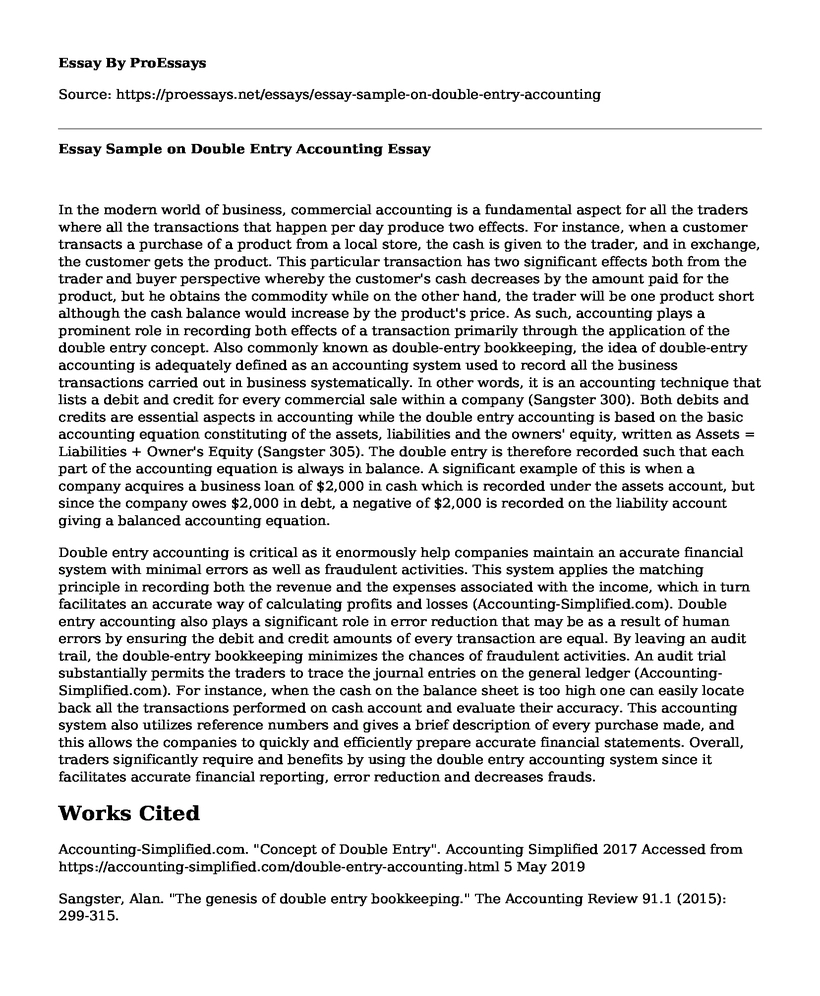In the modern world of business, commercial accounting is a fundamental aspect for all the traders where all the transactions that happen per day produce two effects. For instance, when a customer transacts a purchase of a product from a local store, the cash is given to the trader, and in exchange, the customer gets the product. This particular transaction has two significant effects both from the trader and buyer perspective whereby the customer's cash decreases by the amount paid for the product, but he obtains the commodity while on the other hand, the trader will be one product short although the cash balance would increase by the product's price. As such, accounting plays a prominent role in recording both effects of a transaction primarily through the application of the double entry concept. Also commonly known as double-entry bookkeeping, the idea of double-entry accounting is adequately defined as an accounting system used to record all the business transactions carried out in business systematically. In other words, it is an accounting technique that lists a debit and credit for every commercial sale within a company (Sangster 300). Both debits and credits are essential aspects in accounting while the double entry accounting is based on the basic accounting equation constituting of the assets, liabilities and the owners' equity, written as Assets = Liabilities + Owner's Equity (Sangster 305). The double entry is therefore recorded such that each part of the accounting equation is always in balance. A significant example of this is when a company acquires a business loan of $2,000 in cash which is recorded under the assets account, but since the company owes $2,000 in debt, a negative of $2,000 is recorded on the liability account giving a balanced accounting equation.
Double entry accounting is critical as it enormously help companies maintain an accurate financial system with minimal errors as well as fraudulent activities. This system applies the matching principle in recording both the revenue and the expenses associated with the income, which in turn facilitates an accurate way of calculating profits and losses (Accounting-Simplified.com). Double entry accounting also plays a significant role in error reduction that may be as a result of human errors by ensuring the debit and credit amounts of every transaction are equal. By leaving an audit trail, the double-entry bookkeeping minimizes the chances of fraudulent activities. An audit trial substantially permits the traders to trace the journal entries on the general ledger (Accounting-Simplified.com). For instance, when the cash on the balance sheet is too high one can easily locate back all the transactions performed on cash account and evaluate their accuracy. This accounting system also utilizes reference numbers and gives a brief description of every purchase made, and this allows the companies to quickly and efficiently prepare accurate financial statements. Overall, traders significantly require and benefits by using the double entry accounting system since it facilitates accurate financial reporting, error reduction and decreases frauds.
Works Cited
Accounting-Simplified.com. "Concept of Double Entry". Accounting Simplified 2017 Accessed from https://accounting-simplified.com/double-entry-accounting.html 5 May 2019
Sangster, Alan. "The genesis of double entry bookkeeping." The Accounting Review 91.1 (2015): 299-315.
Cite this page
Essay Sample on Double Entry Accounting. (2022, Dec 19). Retrieved from https://proessays.net/essays/essay-sample-on-double-entry-accounting
If you are the original author of this essay and no longer wish to have it published on the ProEssays website, please click below to request its removal:
- Horse Boarding Farm Business Essay
- Essay Sample on Principles of Food and Beverage Service Management Changes
- Evaluation Essay on Intercontinental Hotel
- Hyatt Regency Hotel's Current Training Needs Paper Example
- Paper Example on Personality Test to Determine Entrepreneurial Aptitude
- Essay Example on the Capital Asset Pricing Model (CAPM): Measuring the Cost of Risk
- Essay Sample on FASB: Establishing Uniform Accounting Standards Since the 1920s







